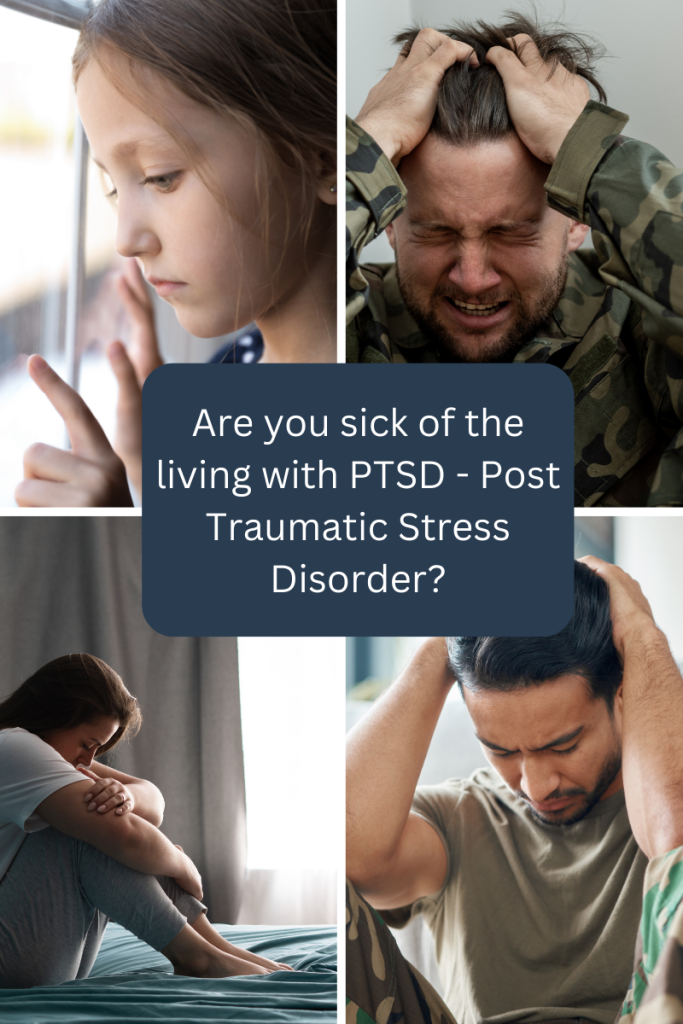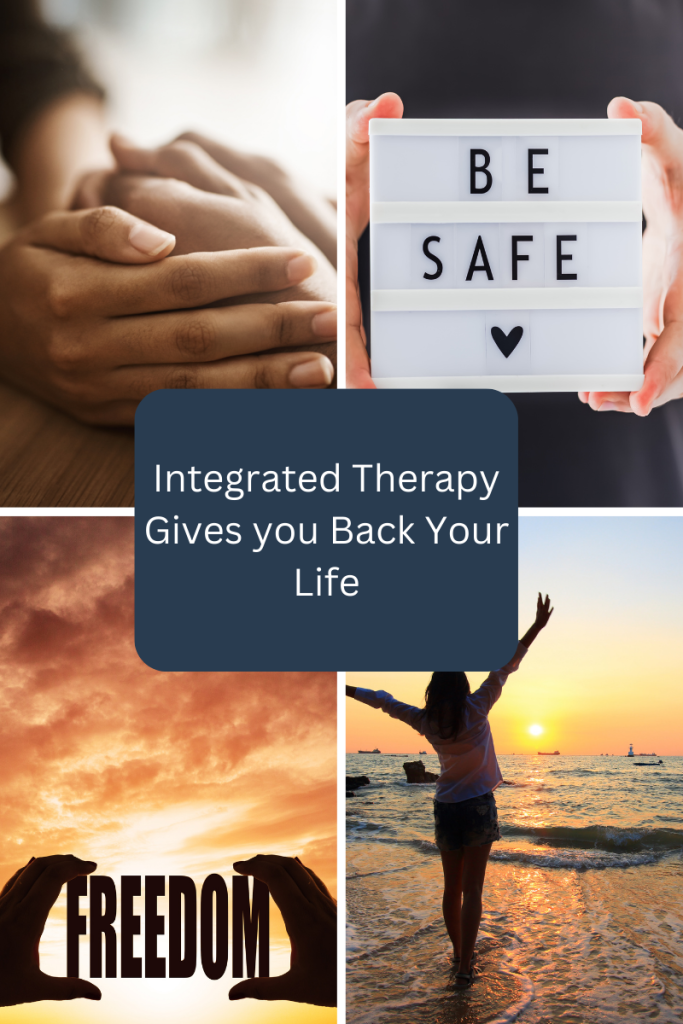Post Tramatic Stress Disorder – PTSD
HOW DOES POST-TRAUMATIC STRESS DISORDER PTSD OCCUR?
Post-traumatic stress disorder (PTSD) occurs when a person has experienced or witnessed one or more extremely traumatic events that have overwhelmed their ability to cope.
These events can be so distressing that they can leave what appears to be a permanent imprint within the person’s psyche; causing the memory of the experience to keep replaying and forcing the person to feel as if they are reliving the experience well after it is over.
,

Common examples include:
- Military Combat: Soldiers and veterans often develop PTSD after exposure to intense violence, combat situations, or the loss of fellow service members.
- Natural Disasters: Survivors of bushfires, earthquakes, hurricanes, floods, and other disasters may relive traumatic scenes or feel persistent fear of similar events happening again.
- Serious Accidents: Car crashes, plane accidents, or workplace injuries can leave lasting emotional scars, especially if the incident is life-threatening.
- Assault and Abuse: Physical, sexual, or emotional abuse, whether experienced as a child or adult, can lead to deep-seated trauma that manifests as PTSD.
- Sudden Loss of a Loved One: The unexpected death of a family member or close friend can trigger PTSD, particularly if the loss is violent or traumatic.
- Medical Trauma: A severe illness, unexpected surgery, or prolonged ICU stay can cause PTSD, especially if the experience is frightening or painful.
- Witnessing Violence: People who witness crimes, shootings, or domestic violence may develop PTSD, even if they were not physically harmed.
- Physical or sexual assault: This could be a one-off date rape or sexual assault experience or ongoing emotional and or physical abuse that leaves the person in a constant state of fear or anxiety.
- Witnessing another person being abused: This can be almost more painful and traumatic than experiencing the suffering themselves and can leave the person feeling shame and guilt for not being able to prevent the situation from occurring.
WHAT DOES PTSD FEEL LIKE?
PTSD, or post-traumatic stress disorder, often feels like a relentless replay of the traumatic event. Without warning a person can be triggered and the most intense emotions, flashbacks can appear to spontaneously occur sending a person into an automatic stress response – Flight, Fright or Freeze.
Everyday activities become overwhelming and can cause the person to avoid places or things that remind them of their trauma. This can lead to isolation, emotional numbness, or heightened anxiety, deeply impacting work, relationships, and overall quality of life.

Anyone can develop PTSD at any time during their lifetime.
Here is a summary of some of the effects of PTSD:
- Reoccurring flashbacks and memories
- Insomnia recurring nightmares.
- Increased alertness and watchfulness
- Being easily startled
- Anxiety & Depression
- Difficulty concentrating
- Heart palpitations or intense feelings of panic when thinking about the event
- Feeling afraid, that the world is unsafe
- Feeling guilty or ashamed of what happened
- Avoiding situations that might remind you of the trauma
WHAT ARE THE LONG-TERM EFFECTS OF PTSD?
PTSD has a huge effect on the body’s nervous system, especially through increased levels of cortisol, the hormone we release in response to stress. For most people with PTSD, cortisol levels remain high for prolonged periods, keeping their body and mind in a “fight or flight” mode – feeling if the original trauma is still happening.
This heightened state of stress will often cause ongoing nightmares that make it very hard to sleep. Over time this lack of rest can lead to complete exhaustion, as the intrusive thoughts, hypervigilance, and emotional struggles continue to plague the person day and night.
HOW DOES PTSD AFFECT MOOD AND THOUGHT PROCESSING?
This constant state of high alert can also take a toll on the brain, particularly areas like the amygdala, which processes fear, and the hippocampus, which manages memory. The amygdala may become more sensitive, leading to intense reactions to even small stressors. Like being hypervigilant in social settings or whenever they are alone. While the hippocampus can struggle to process memories effectively, sometimes making it hard to distinguish between past and present.
HOW DOES PTSD AFFECT THE BODY?
Long-term cortisol elevation doesn’t only impact the brain; it can also add a huge strain on the body over time, leading to higher risks of heart issues, immune challenges, and adrenaline fatigue. People with PTSD often describe feeling tense, jumpy, or easily startled, and it can be hard for them to relax, even in safe environments. Understanding these effects can help foster compassion and support for those living with PTSD, helping them on their journey toward healing.
HERE IS THE GOOD NEWS
I understand how deeply challenging it can be to live with PTSD, feeling as if the past is always close, and that peace is just out of reach. But know that healing is possible, and there are gentle ways to guide you out of this internal struggle and help you find calm and control again.

WITH INTEGRATED THERAPY YOU CAN TAKE BACK CONTROL
Here’s how therapy can help
Through Hypnotherapy and NLP, I will work with you to calm your central nervous system and soothe that constant flight, fright freeze state. So that you can begin to feel safer from the inside out.
Together, we’ll work to release those painful memories, so that they no longer have control over you. By letting go of those overwhelming emotions and sensations connected to the trauma, you will become more connected to the body and the present, This allows space for something new and gives you the power to nolonger constantly relive the pain of those past experiences.
With the use of EMDR (Eye Movement Desensitization and Reprocessing), you’ll find that these memories become less vivid, and you will feel lighter and more in control. Finally able to put those experiences in the past where they belong.
In addition, Mindfulness practices like grounding techniques, breathing exercises, and gentle awareness practices will help you to connect to the present, reminding you that you are safe and that the trauma is now over and you are now free to start living your life again.
Through Counselling, we will explore those thought patterns and beliefs that have kept you locked in the trauma cycle. You will learn to look at those past experiences without blame and see yourself and the experiences themselves from a more empowering perspective.
Many people with PTSD carry feelings of guilt, shame, or fear that are hard to shake. One of the most important things for victims of PTSD to understand is that it’s not their fault. We will work together to reframe those negative thoughts and beliefs that have locked you in this trauma cycle, bringing you closer to a place of self-compassion and a deeper understanding of yourself and the experiences themselves.
All of these methods work together to create integrated therapy you will experience at The Heart of The Matter Wellness Centre.
All are designed to help you reconnect with your true self, free from the pain of the past and begin to live the life you were born to live.
WHAT YOU CAN EXPECT FROM EVERY SESSION
I will offer you a gentle, supportive non-judgemental space for you to open up and begin to heal.
You deserve to feel safe and whole, and I’m here to guide you every step of the way.
Don’t allow other people’s behaviour or those experiences from the past to define how you think and feel about yourself today.
If you are ready to heal please contact Donna on 0424300678 and let’s make a time to start this healing process today.






